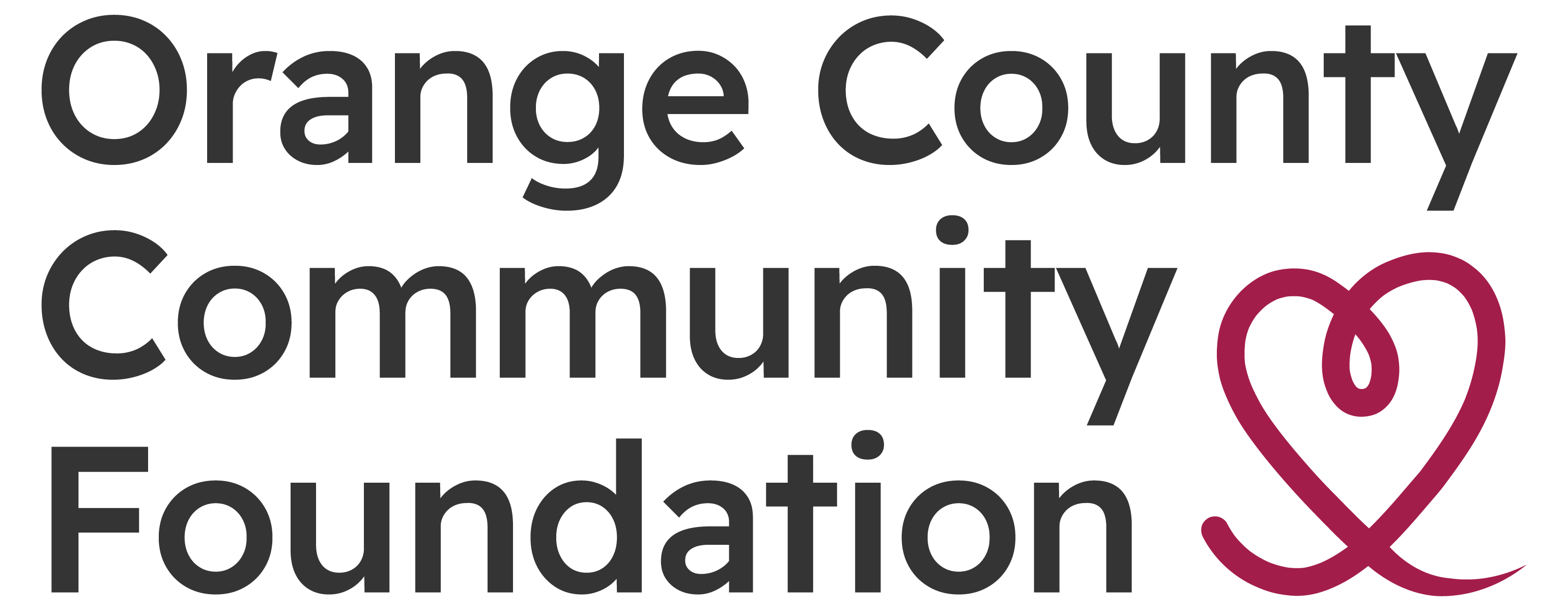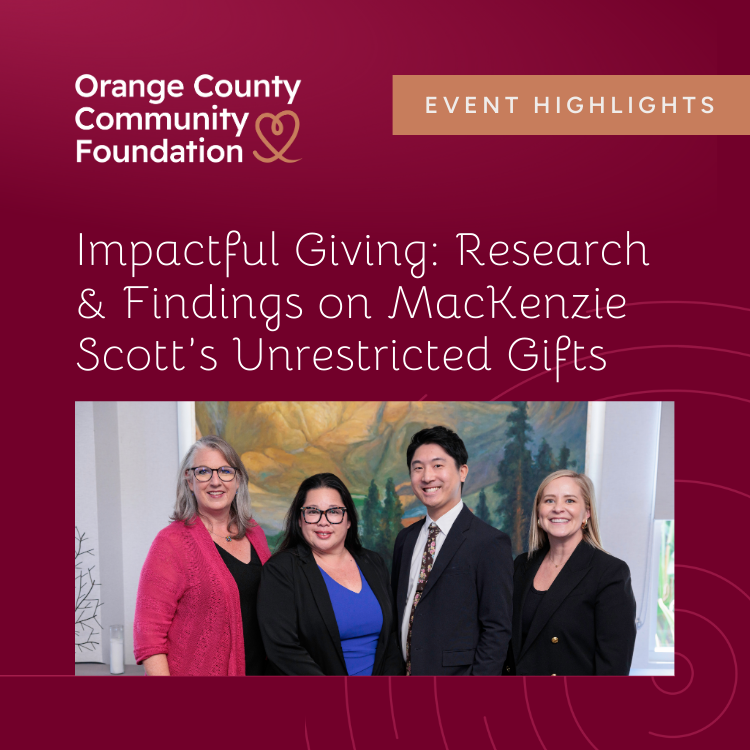Recently, the Orange County Community Foundation (OCCF) hosted a powerful presentation titled Impactful Giving: Research & Findings on MacKenzie Scott’s Unrestricted Gifts, presented by Elisha Smith Arrillaga, Ph.D., Vice President of Research, for The Center for Effective Philanthropy (CEP). The presentation was to members of OCCF’s Family Foundation Alliance, a membership group that brings together family foundation leaders to network, collaborate and learn about best practices in philanthropic giving. The event featured key insights from Dr. Smith Arrillaga’s research on two years of Scott’s Giving and a panel discussion with leaders from two Orange County nonprofit organizations that benefited from Scott’s generosity.
In just three years, MacKenzie Scott gave more than $14 billion in unrestricted grants to more than 1,600 organizations. Her gifts have often come as a surprise to nonprofit recipients, with no restrictions on how or when they must be used, and with few, if any, reporting requirements. These gifts have been transformational for recipient organizations.
MacKenzie Scott’s giving to date has broken the mold of typical approaches to philanthropy, even among megadonors and large foundations. So far, the data CEP gathered over the last two years suggests that Scott’s giving continues to have profound effects on recipient organizations and that the fears many other funders express have not materialized.
Key Takeaways from Dr. Elisha Smith Arrillaga’s Presentation
Dr. Arrillaga kicked off the event with a presentation of CEP’s latest research on MacKenzie Scott’s unrestricted gifts, highlighting the distinctions between two of Scott’s primary grant processes: those facilitated by Bridgespan and Yield Giving. While the Bridgespan approach involved a light vetting process, including interviews and “off the shelf” documentation requests, the Yield Giving process was more streamlined, often culminating in a brief phone call to announce the award.
Dr. Smith Arrillaga shared how these unrestricted funds have provided recipient organizations with the flexibility to pursue strategic priorities, build financial resilience, and invest in long-term capacity building. She emphasized the importance of balancing trust-based philanthropy with accountability. Key points included:
- Seventy-nine percent of nonprofit leaders are using some portion of Scott’s funding to engage in new programmatic initiatives or improve existing initiatives.
- Nonprofit leaders report that these funds not only allowed organizations to advance equity but allowed them to do so more effectively than they could have otherwise.
- Eighty-eight percent of organizations interviewed described the grant improving morale, feelings of empowerment, or capacity to think creatively for both staff and leadership — all toward better serving the organization’s mission.
- Sixty-six percent of the leaders of color interviewed said that the grant gave them greater courage to be assertive in their decision-making and to advocate for those who share their backgrounds, both in the nonprofit sector and in their communities at large.
- Ninety-five percent of leaders believe that this grant has or will strengthen the long-term financial sustainability of their organization to some degree.
- Nearly all nonprofit leaders surveyed changed their approach to fundraising after receiving a grant from Scott, most frequently by using the grant as evidence of their organization’s credibility.
- Seventy percent of funders interviewed say their organization’s thinking or practices have been influenced by recent giving trends — including Scott’s approach to giving — even if just to affirm their ongoing efforts.
Panel Discussion: The Local Impact of Unrestricted Giving
Following Dr. Smith Arrillaga’s presentation, Keri Mesina, Director of the Center for Engaged Philanthropy at OCCF, moderated a panel discussion featuring Brian Tom, Development Manager at the Orange County Asian Pacific Islander Community Alliance (OCAPICA), and Burgandie K. Onekea, Regional Vice President & Executive Director at Junior Achievement of Orange County & Inland Empire.
Insights from Brian Tom
Brian shared OCAPICA’s experience of receiving funding from Yield Giving. The organization used its $3 million unrestricted grant to establish a diversified investment strategy, generating an average of $15,000 per month in unrestricted income. This financial stability has enabled OCAPICA to support underfunded programs, such as youth mental health services, rental assistance for the unhoused, and to increase staff salaries that were previously constrained by government grants. Brian emphasized how the grant has fortified OCAPICA’s cash flow, allowing the organization to prepay payroll and benefits while waiting for reimbursement from county contracts, thus mitigating financial strain and enabling OCAPICA to better serve the community.
Insights from Burgandie Onekea
Burgandie highlighted Junior Achievement’s use of the national grant to expand capacity and programming at the local level. Her region focused on capacity building, increasing financial literacy, entrepreneurship, workforce readiness initiatives, and investing in programming for schools, and the organization’s overall infrastructure. They also prioritized forming new community partnerships, such as collaborations with the Braille Institute, EXP, and Boys & Girls Club. Burgandie addressed the benefits of trust-based philanthropy, maintaining transparency with stakeholders, and driving alignment with local strategies as well as perceived challenges of communicating the impact of such a significant gift.
Addressing Challenges and Future Opportunities
During the Q&A session, panelists and audience members engaged in a dynamic discussion on the broader implications of large, unrestricted gifts. Dr. Smith Arrillaga acknowledged that while such funding can be transformative, it also presents challenges, such as managing a sudden influx of resources and ensuring alignment with long-term goals. She encouraged family foundations to consider how they can adopt similar practices while mitigating risks, such as fostering strong, ongoing relationships with grantees and providing support for capacity-building initiatives.
Brian and Burgandie both shared how receiving a “seal of approval” from MacKenzie Scott has positively impacted their organizations’ reputations, opening doors to new funding opportunities and partnerships. However, they also noted the importance of strategic planning and effective communication to leverage these gifts for sustainable growth and community impact.
MacKenzie Scott’s Influence in Philanthropy
MacKenzie Scott’s approach to philanthropy has undeniably influenced the sector, setting a precedent for trust-based, unrestricted giving. The panelists agreed that her model challenges traditional notions of philanthropy by placing greater trust in the expertise and judgment of nonprofit leaders. Family foundations and other funders are now determining how to incorporate elements of this approach into their own practices while maintaining their commitment to accountability and impact.
As the event concluded, participants were left with a renewed sense of possibility and inspiration. MacKenzie Scott’s unrestricted grants are not just financial gifts, they are a call to reimagine the way philanthropy can support systemic change and empower communities to thrive.
For more information on The Family Foundation Alliance and how to become a member please visit, https://www.oc-cf.org/ffa.






